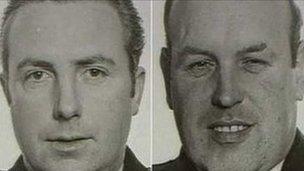Smithwick: Garda lacked co-operation after Narrow Water
- Published

Harry Breen and Bob Buchanan were murdered by the IRA in 1989
The Smithwick Tribunal has heard scathing evidence of the lack of co-operation by Irish police in the Narrow Water bomb attack.
Witness 68, who was the chief investigating officer of the Narrow Water bomb attack gave his evidence to the Dublin tribunal via video link from Belfast.
The British Army suffered its greatest single casualty toll in the Troubles at Narrow Water in south Down in an IRA attack in 1979.
The Narrow Water bombs were detonated from a site in County Louth.
The Smithwick Tribunal is investigating allegations of Garda collusion in the 1989 IRA murders of two senior RUC officers, Chief Supt Harry Breen and Supt Bob Buchanan.
Witness 68 told the tribunal that "nothing was made available" to the RUC from the County Louth site used in the Narrow Water attack.
"Our objective was to attain something evidential from the scene and we wanted that at all costs but it has to be said that the help was non-existent," he said.
The tribunal also heard that within hours of the atrocity and at the scene of the attack, senior RUC officers were advised to "keep the gardai on side".
"I was given a briefing and told not to discuss anything with Detective Sergeant Owen Corrigan because of the risk of a leak," witness 68 said.
"My instruction was that Mr Corrigan was a risk, that said my co-operation with Mr Corrigan was of a limited nature and at times could be described as obstructive."
Retired Det Sgt Owen Corrigan is one of three former gardai under the spotlight at the tribunal. He strenuously denies all the allegations against him.
The tribunal has previously heard that in the days following the attack, the bomb detonation site was destroyed, before Northern Ireland's top forensic scientist, Dr Alan Hall, could gather evidence.
"We were given an undertaking that the scene would be preserved overnight" said Witness 68 today.
The witness said that the Garda responsible for the scene was the now retired Det Sgt Owen Corrigan.
"The place was completely scythed down and when Mr Hall returned, he was enraged."
Two men, Brendan Burns and Joe Brennan, were arrested close to Omeath, County Louth, as suspects.
They were later released by Irish police who said there was no evidence to hold them for anything other than motoring offences.
However, Witness 68 told the tribunal that a leaked copy of a Garda forensic report, he read years later, said that traces of explosives and firearm residue were found on the clothing of the men.
The tribunal also heard that traces of ammonium nitrate were discovered in the car of one of those arrested.
"Statements, interview notes, none of that was made available to us."
"We had asked to be consulted before they were released, but that did not happen."
"Burns and Brennan were terrorists along the border," said Witness 68."They were responsible for the deaths of others long after, due to their bombing expertise."
"We did not want to frighten them into not coming back to Northern Ireland. So we decided the best thing to do was to 'keep our powder dry', they would come home again which is what happened in 1995."
Brendan Burns, from Crossmaglen, died in an explosion in 1989.
Joe Brennan was convicted of firearms offences in 1995.
The tribunal also heard that within hours of the atrocity and at the scene of the attack, senior RUC officers were advised to "keep the Gardai on side".
"I was given a briefing and told not to discuss anything with Detective Sergeant Owen Corrigan because of the risk of a leak."
"My instruction was that Mr Corrigan was a risk, that said, my co-operation with Mr Corrigan was of a limited nature and at times could be described as obstructive."
- Published16 February 2012
- Published10 February 2012